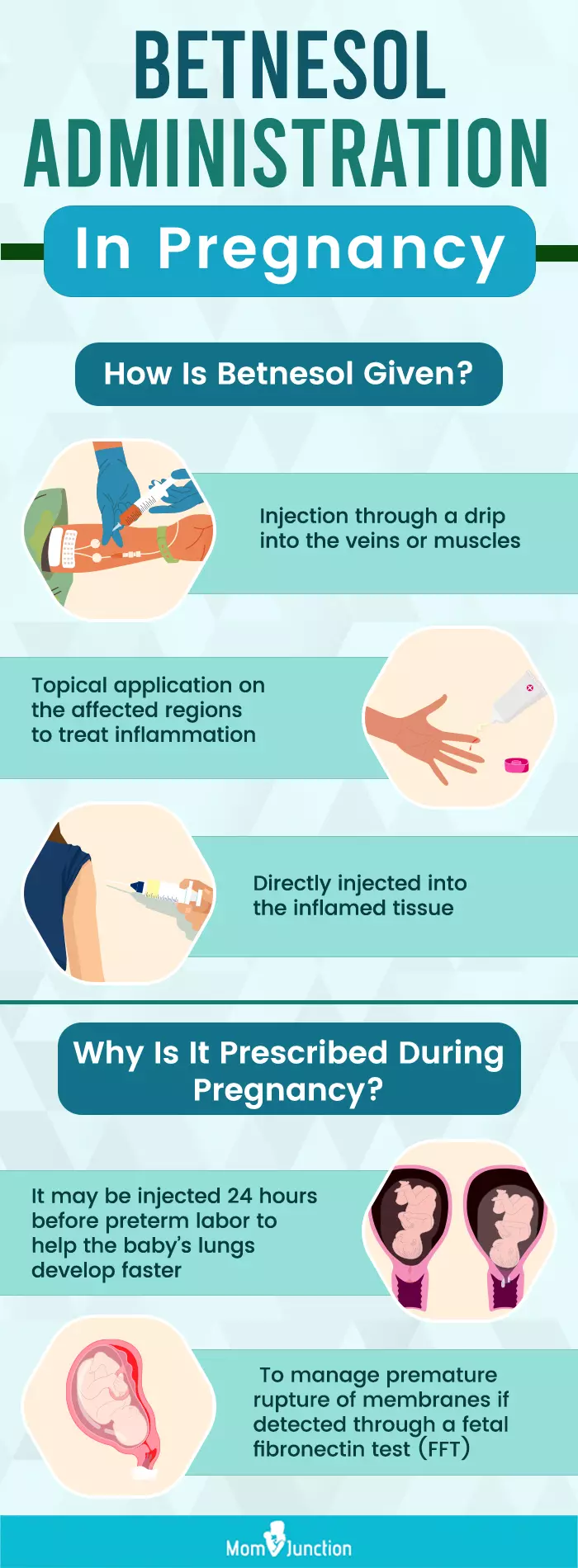
Image: Shutterstock
Betnesol injection during pregnancy is given to women who are at risk of delivering their baby before 34 weeks of gestation. Administering Betnesol helps decrease the chances of preventing issues related to preterm birth in babies. Betnesol is a corticosteroid that is commonly used in the treatment of hormonal imbalances or autoimmune disordersiDisorders where the body’s immune system erroneously attacks and damages healthy cells and tissues (1) (2). Corticosteroids are substances that are required for the proper functioning and regulation of the salt and mineral levels in the body (3). Doctors usually prescribe this injection to accelerate the rate of lung maturation in babies that are at risk of preterm delivery (particularly in a high-risk pregnancy). However, understanding the implications of Betnesol use during pregnancy is crucial for expectant mothers. It is essential to weigh such medication’s benefits against potential side effects. Continue reading this post as we tell you about Betnesol, its recommended dosage, and possible side effects (4).
Key Pointers
- Betnesol injections are administered to mothers who are at risk of giving birth to their child before 34 weeks of gestation in order to help prevent problems associated with preterm birth.
- Betnesol is a corticosteroid frequently used to treat autoimmune diseases or hormonal abnormalities.
- The drug is often recommended for moms at risk of preterm delivery between 24 0/7 weeks and 33 6/7 weeks of gestation.
- In preterm labor, the injection is given to aid in developing the fetus’ lungs or prevent premature membrane rupture.
Is It Safe To Take Betamethasone Injection During Pregnancy?
There aren’t enough studies to assess the safety of Betnesol concerning pregnancy complications. According to the US Food and Drug Administration, Betnesol is a category C drug, which means animal studies have shown adverse effects on the unborn, and there are no well-controlled studies in humans (5).
The drug is recommended only when its benefits outweigh fetal or maternal health risks. Two doses of Betnesol injection are given intramuscularly 24 hours apart in the case of preterm pregnancy. And delivery is ideally done 24 hours after the second dose.

Long-term use of Betnesol in pregnancy may cause adverse effects on the baby. However, in the case of preterm delivery, since it is usually administered only for two days, adverse effects can be negligible while there is a benefit to the baby in terms of accelerated lung maturity.
Dr. Alan Lindemann, MD, an obstetrician, maternal mortality expert, and former clinical associate professor at the University of North Dakota, says, “In the US, during pregnancy, Betnesol (betamethasone) is used in labor to promote lung maturation for babies at risk for preterm delivery. It is given 48 and 24 hours before delivery. I am unaware of any research indicating that babies have less movement after Betnesol injections for fetal lung maturation.”
Ideal Dosage Of Betnesol Injection When Pregnant
Betnesol is administered when the mother shows signs of premature delivery (4). The dosage of the injection or steroid varies from case to case and is decided by the doctor depending on the intensity of your preterm risk and your baby’s health. It is crucial to follow medical advice closely, as incorrect dosing can lead to inadequate fetal lung development or increased side effects. Healthcare providers may also consider the mother’s overall health and any pre-existing conditions when determining dosage.
The American College of Obstetricians and Gynecologists recommends that the drug be given to the pregnant woman ‘based on the family’s decision regarding resuscitationiA process of reviving a person’s heartbeat and consciousness post a life-threatening situation ’.
How Is Betnesol Given?
Betnesol is given in any of the following ways:
- Injection through a drip into the veins or muscles
- Topical application on the affected regions to treat inflammation.
- Directly injected into the inflamed tissue.
The medication is prescribed on a short-term basis for a few days. You should not stop the dosage abruptly as it will lead to withdrawal symptoms.
When Is Betnesol Administered During Pregnancy?
Doctors usually prescribe Betnesol between the gestational age of 24 0/7 weeks and 33 6/7 weeks to mothers at risk of preterm delivery within seven days, including those with ruptured membranes and multiple gestations (4).
 Point to consider
Point to considerWhy Is Betnesol Prescribed During Pregnancy?
Betnesol is prescribed in the case of the following complications:
- Preterm labor: When the baby is born before full-term, around 32 to 35 weeks of pregnancy, the lungs aren’t fully formed and are non-functional. Studies proved that corticosteroids accelerate the alveoli (the tiny air sacs of the lungs which help in gaseous exchange) formation, and also speed up the surfactantiA protein complex present in the lungs that are crucial to prevent the collapse of alveoli during breathing production which is helpful in proper functioning of the lungs (6).

So, Betnesol steroid injection is administered in this case to help the lungs develop quickly. It is given about 24 hours before the anticipated preterm labor (7).
- Premature rupture of membranes: Also known as PROM, this is a situation where the membranes rupture before the completion of 37 weeks of pregnancy, resulting in preterm birth (8). The risk is determined through fetal fibronectin test (FFT), where a swab of cervical secretions is tested for fibronectin protein (a protein that secures amniotic sac to the uterus) (9). If the test shows positive, Betnesol injection is prescribed.
 Quick fact
Quick factWhat Are The Side Effects Of Betnesol Injections During Pregnancy?
Here are the side effects of Betnesol injection during pregnancy:
- A rise of blood sugar level immediately after the injection may cause problems in a diabetic mother and require an increase in her dosage of anti-diabetic medicines.

“Since Betnesol is a steroid, in theory, it could cause weight gain in terms of the increasing appetite and probably some water weight gain. However, most of the time, this medication would be given at the end of pregnancy to promote and accelerate fetal lung maturation in the case of preterm labor and delivery,” Dr. Lindemann opines.
It is important to monitor your health closely during treatment. Contact your healthcare provider immediately if you experience any severe side effects, such as unusual mood changes or signs of infection. Early intervention can mitigate potential complications.
Precautions When Using Betnesol Injections During Pregnancy
You should take Betnesol injection during pregnancy only under your doctor’s supervision. The healthcare professional’s instructions will be accurate and will be given to you as per your requirements.
Read the instructions on the medication label and know the ingredients. Tell your doctor if you are allergic to any ingredients listed on the label.
Conditions such as blood clotting, hypertension, diabetes, and liver disease should be known to your doctor. Also, certain medications like aspirin, mifepristone, and warfarin could interact with Betnesol injection (14). Let your healthcare provider know about these to provide specific directions for use.
 Research finds
Research findsFrequently Asked Questions
1. What should I discuss with my doctor before taking Betnesol?
Discuss your medical history, any existing health issues such as diabetes or hypertension, and other medications you’re taking. This ensures your physician can make a fully informed decision regarding Betnesol administration during pregnancy.
2. Does Betnesol cause high blood pressure?
There are studies which indicate that the administration of glucocorticoid, including Betnesol, may increase blood pressure. However, when the drug is used for short-term effects, it rarely causes adverse symptoms. Nevertheless, talk to your doctor about the medication before taking it (11).
3. Can I take Betnesol in a cough?
Betnesol may be used for allergy treatments in certain cases. However, using it during pregnancy may require doctors to consider its benefits and risks. Since Betnesol is a prescription drug, talk to your doctor to know how it might affect you if taken (15 (16).
4. What happens if I swallow Betnesol?
Betnesol comes in different forms. If it is in a soluble tablet form, it may be swallowed without difficulties (17). Moreover, if ear, nose, and eye drop containing Betnesol as a primary ingredient is swallowed accidentally, adverse events are unlikely to occur (18). However, it is crucial to be vigilant and seek immediate medical intervention in case of any complications.
If there is a risk of premature birth, doctors recommend administering Betnesol injection during pregnancy in obedience to medical guidelines. This medication is prescribed during pregnancy if the benefits outweigh the risks. Betnesol is a corticosteroid medication that helps promote alveoli and surfactant formation in babies. If given 24 hours before the anticipated preterm delivery, this drug helps reduce issues caused by immature lungs (such as respiratory distress syndrome) in preemiesiNewborns born prior to the completion of 37 weeks of pregnancy . In addition, doctors prescribe Betnesol if the cervical swab examination is positive for fibronectin proteins, which secure the amniotic sac to the uterus.
Infographic: How And Why Is Betnesol Administered During Pregnancy?
Sometimes when you are prescribed medication during pregnancy, you may have your own doubts. But before panicking, you must understand the reason behind your OB-GYN prescribing it and how it can help you. So this infographic explains all that is to know about Betnesol in pregnancy. Illustration: Momjunction Design Team
Illustration: Is It Safe To Take Betnesol Injection During Pregnancy?

Image: Dall·E/MomJunction Design Team
References
1. Betamethasone sodium phosphate; PubChem Open Chemistry Database; National Center for Biotechnology Information.
2. Betnesol 500 microgram soluable tablets betamethasone; Patient Information Leaflet; Health Products Regulatory Authority.
3. Wiebke Arlt & Paul M. Stewart; Adrenal corticosteroid biosynthesis, metabolism, and action; Endocrinology & Metabolism Clinics of North America
4. Antenatal Corticosteroid Therapy for Fetal Maturation; American College of Obstetricians and Gynecologists
5. Celestone® Soluspan®*; FDA (2008)
6. Julian Vyas, Sailesh Kotecha; Effects of antenatal and postnatal corticosteroids on the preterm lung; ACD Fetal&Neonatal edition; British Medical Journal.
7. Pregnancy and birth: Before preterm birth: What do steroids do; Cologne, Germany: Institute for Quality and Efficiency in Health Care (IQWiG) (2018)
8. Premature rupture of membranes Practice Bulletin No. 172; Obstetrics & Gynecology; Wolters Kluwer (2016).
9. Honest Honest et al.; Accuracy of cervicovaginal fetal fibronection test in predicting risk of spontaneous preterm birth; systematic review; US National Library of Medicine National Institutes of Health (2010).
10. J. Gordon Marshall; Consideration of steroids for endodontic pain; Endodontic Topics (2002)
11. Daniel E. Becker; Basic and clinical pharmacology of glucocorticosteroids; Anesth Prog (2013)
12. Juan Piazze et al.; Full-term-pregnancy effects of antenatal betamethasone administration on short-term variation as assessed by computerized cardiotocography; J Prenat Med (2012)
13. Betamethasone Dosing Interval – 12 or 24 Hours? Us National Library of Medicine
14. Betamethasone injection; Cleveland Clinic
15. Betamethasone for eyes, ears and nose; NHS
16. Betamethasone; Memorial Sloan Kettering Cancer Center
17. Betamethasone 500 microgram Soluble Tablets; EMC
18. Betnesol-N Eye, Ear and Nose Drops; EMC
Community Experiences
Join the conversation and become a part of our nurturing community! Share your stories, experiences, and insights to connect with fellow parents.
Read full bio of Dr. Kajari Mukherjee
- Dr. Alan Lindemann is an obstetrician and maternal mortality expert, who worked as a clinical associate professor at the University of ND. An alumnus of the University of ND and the University of Minnesota, he is a member of the American College of Obstetricians and Gynecologists and the American Medical Association.
 Dr. Alan Lindemann is an obstetrician and maternal mortality expert, who worked as a clinical associate professor at the University of ND. An alumnus of the University of ND and the University of Minnesota, he is a member of the American College of Obstetricians and Gynecologists and the American Medical Association.
Dr. Alan Lindemann is an obstetrician and maternal mortality expert, who worked as a clinical associate professor at the University of ND. An alumnus of the University of ND and the University of Minnesota, he is a member of the American College of Obstetricians and Gynecologists and the American Medical Association.
Read full bio of shreeja pillai
Read full bio of Rebecca Malachi
Read full bio of Dr. Joyani Das





















